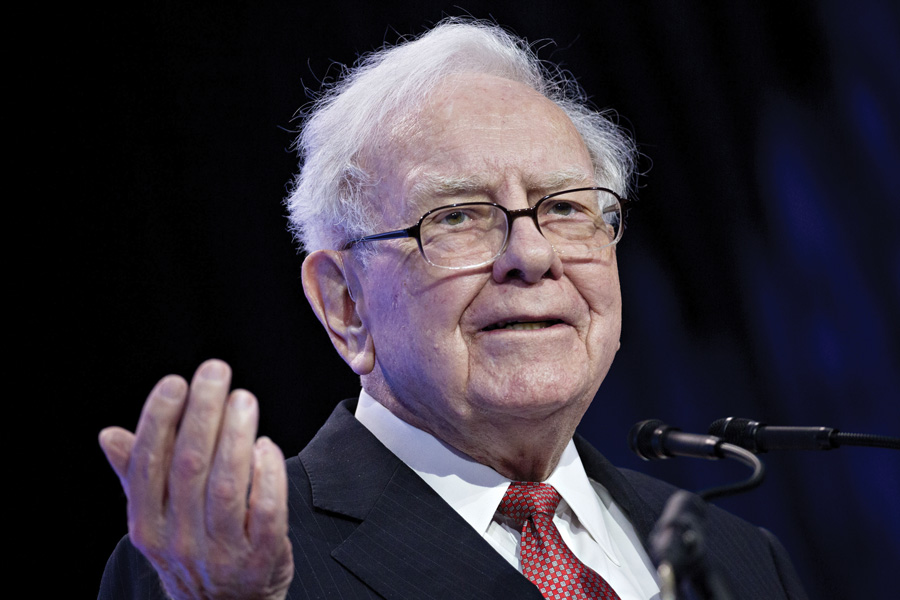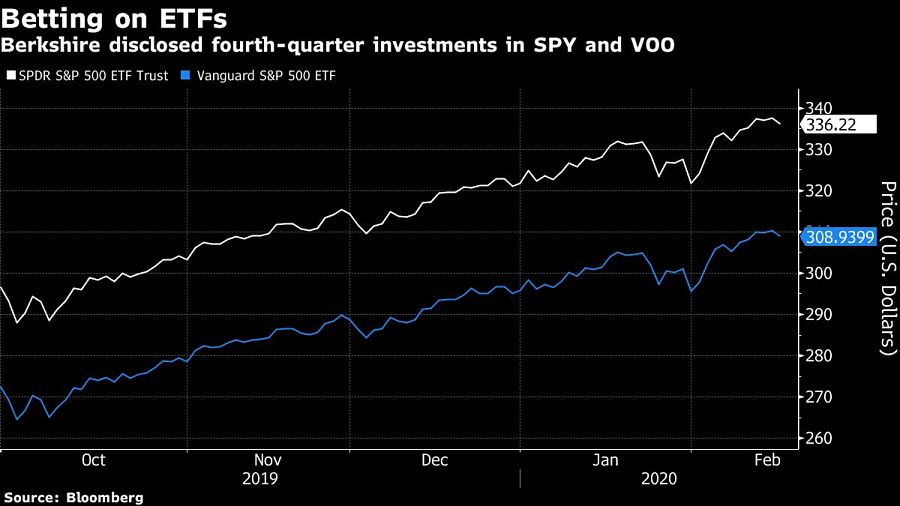

Legendary investor Warren Buffett’s Berkshire Hathaway Inc. just gave its blessing to the $4.6 trillion exchange-traded fund market — at least in one of its pension plans.
Berkshire added to the Vanguard S&P 500 ETF (VOO) and SPDR S&P 500 ETF Trus (SPY) in the final quarter of 2019, according to a regulatory filing. The relatively small investments, which totaled $25 million across both funds, are Berkshire’s only publicly disclosed ETF holdings in its most recent quarterly 13F filing. The investments are in a pension plan, according to Mr. Buffett’s assistant, Debbie Bosanek.
Mr. Buffett, whose Berkshire holds a record $128 billion in cash and U.S. Treasury bills, has been asked before about why he didn’t put the company’s unused cash into an index fund. The 89-year-old investor said last year at his annual shareholder meeting that he thinks Berkshire should have some cash available to deploy quickly if the chance to make a big acquisition arises, even though he’d rather own an index fund than Treasury bills.
Back in 2007, he argued that Berkshire’s stock picks could do better than the S&P 500 Index. Berkshire is set to release its annual letter to shareholders on Saturday.

The fourth-quarter addition is arguably the “ultimate endorsement” for ETFs and their different usages, said Bloomberg Intelligence’s Eric Balchunas. Large institutions will often park money in ETFs to keep exposure to the market while minimizing cash drag in their portfolios, he said, which is likely what Berkshire has started to do with its record cash pile.
“They use it almost as a temporary parking spot, and I think the liquidity is what they’re attracted to,” Mr. Balchunas said.
In that scenario, ETFs are essentially being used as an alternative for derivatives contracts, he said. He estimates that this manner of institutional usage accounts for roughly 5% to 10% of ETF assets.
Climbing cash pile
Berkshire has accumulated a stake of more than $71 billion in Apple Inc. in recent years and during the last three months of 2019, it purchased stock in Kroger Co. and Biogen Inc.
Still, Berkshire has failed to find a massive acquisition of a company to keep growing the conglomerate in recent years. That’s weighed on its stock, with the Class A shares increasing nearly 11% last year, short of the almost 29% gain in the S&P 500 during the same period.
In the meantime, Berkshire is likely using these ETFs as a liquidity way station of sorts, said Todd Rosenbluth, CFRA’s director of ETF research.
“SPY and VOO provide institutional investors the ability to stay in the market, while keeping their options open as they seek out individual stocks,” Mr. Rosenbluth said.

By listening for what truly matters and where clients want to make a difference, advisors can avoid politics and help build more personal strategies.

JPMorgan and RBC have also welcomed ex-UBS advisors in Texas, while Steward Partners and SpirePoint make new additions in the Sun Belt.

Counsel representing Lisa Cook argued the president's pattern of publicly blasting the Fed calls the foundation for her firing into question.

The two firms violated the Advisers Act and Reg BI by making misleading statements and failing to disclose conflicts to retail and retirement plan investors, according to the regulator.

Elsewhere, two breakaway teams from Morgan Stanley and Merrill unite to form a $2 billion RIA, while a Texas-based independent merges with a Bay Area advisory practice.
Orion's Tom Wilson on delivering coordinated, high-touch service in a world where returns alone no longer set you apart.
Barely a decade old, registered index-linked annuities have quickly surged in popularity, thanks to their unique blend of protection and growth potential—an appealing option for investors looking to chart a steadier course through today's choppy market waters, says Myles Lambert, Brighthouse Financial.
